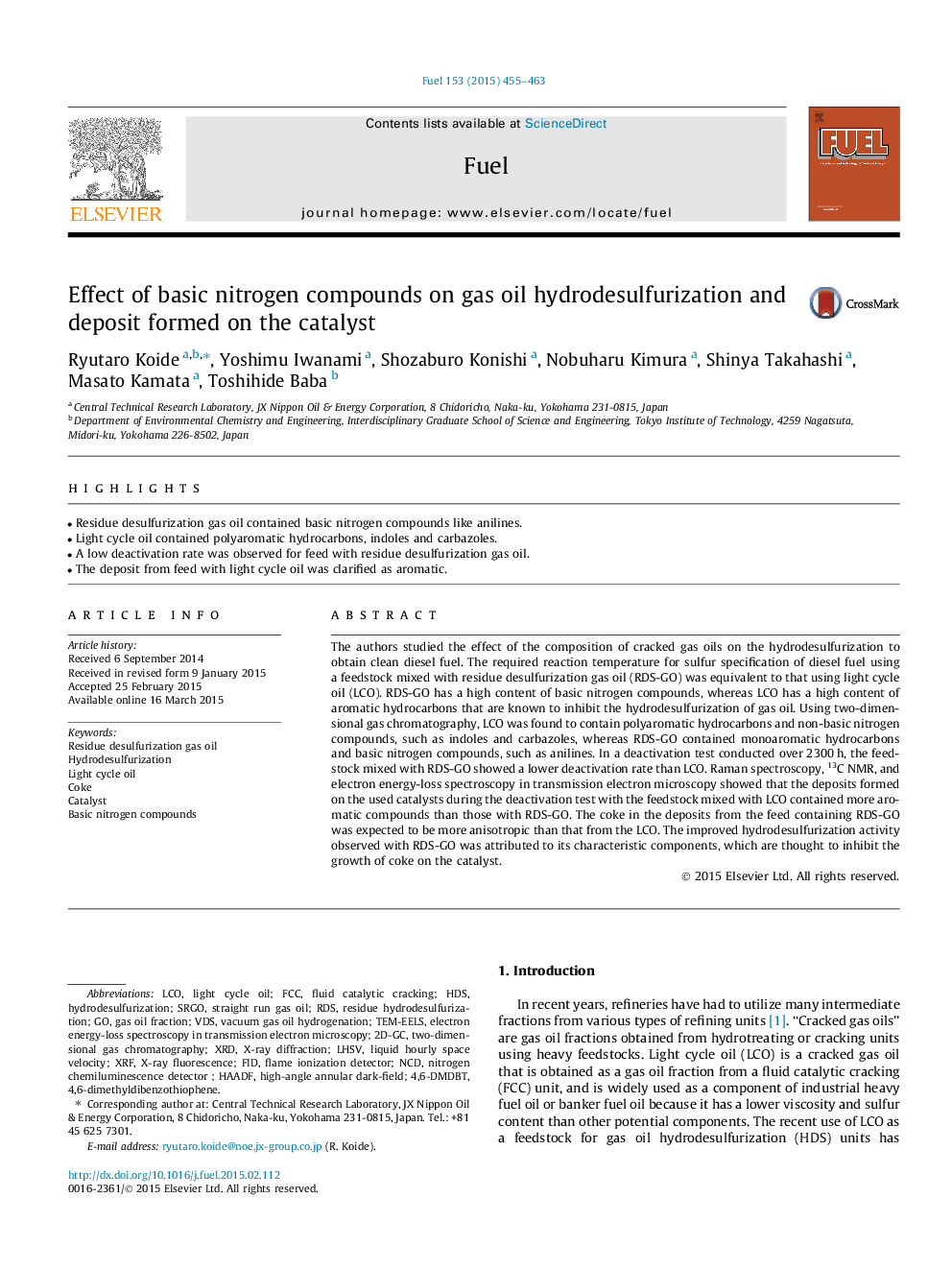| کد مقاله | کد نشریه | سال انتشار | مقاله انگلیسی | نسخه تمام متن |
|---|---|---|---|---|
| 6635612 | 461120 | 2015 | 9 صفحه PDF | دانلود رایگان |
عنوان انگلیسی مقاله ISI
Effect of basic nitrogen compounds on gas oil hydrodesulfurization and deposit formed on the catalyst
ترجمه فارسی عنوان
اثر ترکیبات نیتروژن پایه بر روی هیدرود سولفوریزاسیون روغن نفت و رسوب روی کاتالیزور شکل گرفته است
دانلود مقاله + سفارش ترجمه
دانلود مقاله ISI انگلیسی
رایگان برای ایرانیان
کلمات کلیدی
SRGOHAADFRDSHDSNCDLCO2D-GCLHSVVDSFCC4,6-DMDBT - 4،6-DMDBT4,6-Dimethyldibenzothiophene - 4،6-دی متیلید بنزوتیوفنNitrogen chemiluminescence detector - آشکارساز شیمیایی نیتروژنflame ionization detector - آشکارساز یونیزاسیون شعلهFluid catalytic cracking - ترک خوردگی کاتالیزور مایعBasic nitrogen compounds - ترکیبات نیتروژن پایهFID - درliquid hourly space velocity - سرعت فضای ساعت مایعXRF - طیف نگاری فلوئورسانس اشعه ایکسX-ray fluorescence - فلورسانس اشعه ایکسhigh-angle annular dark-field - میدان دایره ای بزرگ زاویه دارlight cycle oil - نفت چرخه نورStraight run gas oil - نفت گاز مستقیمHydrodesulfurization - هیدرود سولفوریزاسیونX-ray diffraction - پراش اشعه ایکسXRD - پراش اشعه ایکسCatalyst - کاتالیستTwo-dimensional gas chromatography - کروماتوگرافی گاز دو بعدیCoke - کک
موضوعات مرتبط
مهندسی و علوم پایه
مهندسی شیمی
مهندسی شیمی (عمومی)
چکیده انگلیسی
The authors studied the effect of the composition of cracked gas oils on the hydrodesulfurization to obtain clean diesel fuel. The required reaction temperature for sulfur specification of diesel fuel using a feedstock mixed with residue desulfurization gas oil (RDS-GO) was equivalent to that using light cycle oil (LCO). RDS-GO has a high content of basic nitrogen compounds, whereas LCO has a high content of aromatic hydrocarbons that are known to inhibit the hydrodesulfurization of gas oil. Using two-dimensional gas chromatography, LCO was found to contain polyaromatic hydrocarbons and non-basic nitrogen compounds, such as indoles and carbazoles, whereas RDS-GO contained monoaromatic hydrocarbons and basic nitrogen compounds, such as anilines. In a deactivation test conducted over 2300Â h, the feedstock mixed with RDS-GO showed a lower deactivation rate than LCO. Raman spectroscopy, 13C NMR, and electron energy-loss spectroscopy in transmission electron microscopy showed that the deposits formed on the used catalysts during the deactivation test with the feedstock mixed with LCO contained more aromatic compounds than those with RDS-GO. The coke in the deposits from the feed containing RDS-GO was expected to be more anisotropic than that from the LCO. The improved hydrodesulfurization activity observed with RDS-GO was attributed to its characteristic components, which are thought to inhibit the growth of coke on the catalyst.
ناشر
Database: Elsevier - ScienceDirect (ساینس دایرکت)
Journal: Fuel - Volume 153, 1 August 2015, Pages 455-463
Journal: Fuel - Volume 153, 1 August 2015, Pages 455-463
نویسندگان
Ryutaro Koide, Yoshimu Iwanami, Shozaburo Konishi, Nobuharu Kimura, Shinya Takahashi, Masato Kamata, Toshihide Baba,
